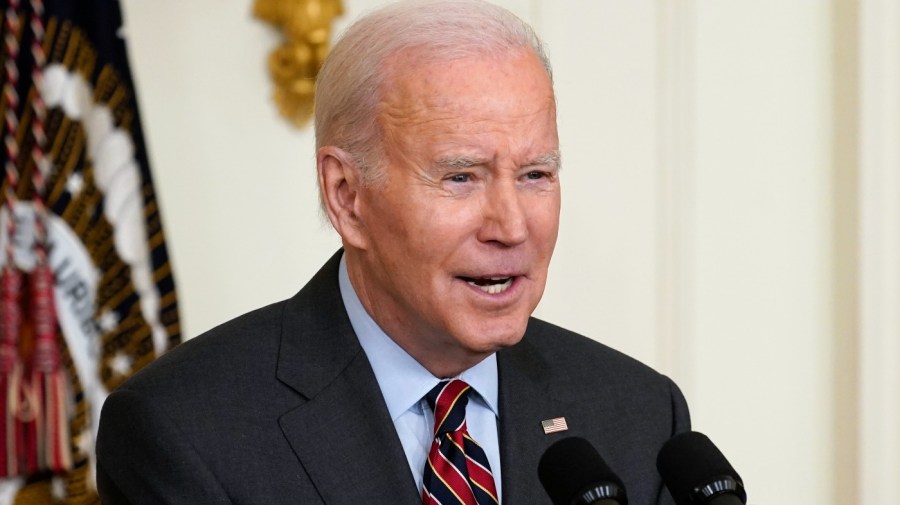Oil cuts expected to raise gasoline prices, creating headache for Biden

The surprise oil production cuts announced by a group of oil producers known as OPEC+ is expected to drive up gasoline prices in the coming weeks, which could create practical headaches for consumers and political headaches for President Biden.
Over the weekend, OPEC+ nations announced that they would pursue new cuts amounting to more than 1 million barrels per day — nearly half of which from Saudi Arabia.
Oil prices jumped up following the news with U.S. benchmark West Texas Intermediate prices rising from roughly $76 per barrel to about $80 per barrel. International benchmark Brent crude jumped up from about $80 per barrel to about $86 per barrel following the announcement.
President Biden himself predicted minimal impacts from the OPEC+ move, saying “It’s not going to be as bad as you think” on Monday.
Even so, experts are expecting a noticeable increase at the pump.
Andrew Lipow, president of consulting firm Lipow Oil Associates, told The Hill he thinks that in the coming weeks, gasoline prices, which stood at about $3.50 per gallon on Monday, will rise between 12 and 16 cents per gallon.
Tom Kloza, global head of energy analysis at the Oil price Information Service predicted an “immediate increase” of 10 to 12 cents per gallon, and added that the cuts also have the potential to contribute to further increases later in the year.
Why OPEC+ is cutting production

Lipow said that the production cuts likely came in response to fears about the global economic picture in the wake of the Silicon Valley Bank crash.
“The market — not only the oil market, but commodities in general, as well as the stock market — was concerned that a small banking crisis could lead to a big banking crisis and a big banking crisis would lead to a slowdown in economic activity, which negatively impacts oil demand,” he said.
Saudi Arabia’s energy ministry described the cuts as “ a precautionary measure aimed at supporting the stability of the oil market.”
The International Energy Agency, a group of oil consuming nations, slammed the OPEC+ decision saying in a written statement that the cuts risk “pushing up oil prices at a time when strong inflationary pressures are hurting vulnerable consumers around the world, especially in emerging and developing economies.”
Abhi Rajendran, an adjunct research scholar at Columbia University’s Center on Global Energy Policy, said that ultimately, the cuts could increase gasoline prices around 20 to 30 cents per gallon over an extended period of time.
Higher gas prices pose threat to Biden

Prior to the cuts, U.S. oil prices had hovered between around $67 and $80 per barrel over the past several months, down from as high as $130 last year.
More broadly, inflation had been slowing down, with the personal consumption expenditures price index falling from January to February.
And while gasoline prices are not expected to approach the whopping $5 per gallon national average that the country saw last summer, any price spike is likely to be bad news politically for President Biden, even if it wasn’t caused by his own actions.
“I’ve got to believe that in the White House today…they’re pissed,” Kloza said.
Republicans last year made high fuel prices a central theme of their campaign. They have recently doubled down, naming an energy bill as their top priority legislation.
Kloza said that the OPEC+ cuts could “invite some sort of further efforts at curbing cartel power” such as the “NOPEC” bill that would allow lawsuits against the oil producing nations under antitrust laws and that the cuts could broadly exacerbate the “adversarial relationship” between the White House and Persian Gulf nations.
“You don’t want to invite White House people and MBS to the same cocktail party these days,” Kloza said, referring to Saudi Crown Prince Mohammed bin Salman.
National Security Council Spokesperson John Kirby said Monday that the U.S. doesn’t “think that production cuts are advisable at this moment given the market uncertainty and we made that clear” when asked to respond to the announcement.
“We’re focused on moving ahead here prices on prices for American consumers…prices at the pump have come down significantly since last year,” he added.
Alex Gangitano contributed
Copyright 2023 Nexstar Media Inc. All rights reserved. This material may not be published, broadcast, rewritten, or redistributed. Regular the hill posts












